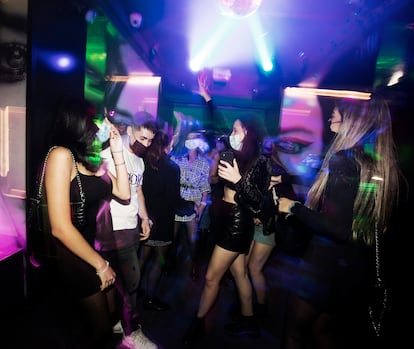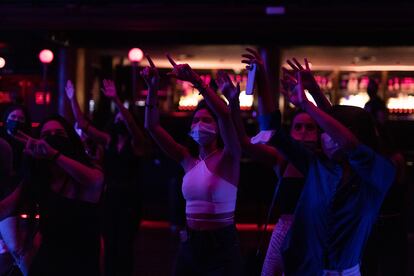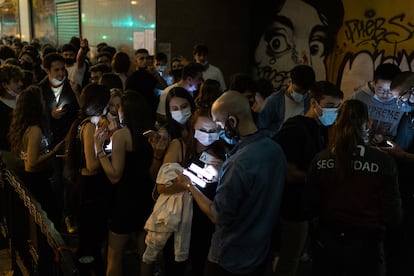As Covid cases drop, dancing returns to Spain’s nightclubs
Only the regions of Murcia and Aragón are maintaining their ban, although face masks and other restrictions remain mandatory across the country

Masks are quickly becoming one of the few visible signs that Spain remains in the grip of the coronavirus pandemic, even though the country entered the low-risk scenario last week, with fewer than 50 cases per 100,000 people over a 14-day period.
In a new sign of the return to normality, nightclubs in many regions of Spain reopened their dance floors this weekend after months of closures. These include Catalonia, Madrid, the Valencia region, Asturias and the Balearic Islands. Nightlife venues in several other regions – which are responsible for their healthcare system, the Covid-19 vaccination drive and coronavirus measures – lifted this restriction earlier this month, and only Murcia and Aragón still prohibit indoor dancing across their territories.
What still remains off limits in most regions is drinking on the dance floor, while face masks continue to be mandatory. Health Minister Carolina Darias on Friday ruled out the possibility of lifting this rule. “We don’t know how the flu or other viruses will behave. We will take this one step at a time, firmly, to bring accumulated incidence rates even lower, and masks play an essential role in this,” she said.
For entrepreneurs, this was long-awaited news. “It was very important to get the dance floors back,” said Joaquim Boadas, of the industry group Spain Nightlife Association. “Without it, the activity loses part of what it’s all about, and if you don’t make it attractive, people will prefer to hold private parties or do botellones [group outdoor drinking binges]. Authorities are finally realizing this, although it comes late.”

Numerous experts consulted by this newspaper agreed that nightlife is one of the most delicate areas in terms of coronavirus transmission. Even though industry leaders claim their venues are safe spaces, epidemiologists and virologists like to underscore that these are indoor locations, generally with very little ventilation, with loud music that forces people to shout – meaning more aerosols in the air – and serving alcohol, which is not very conducive to strict observance of the law.
Much of the above was on display in Barcelona last Thursday. Despite the rules, it was easy to see people drinking in forbidden areas, their masks down or completely removed while on the dance floors, and no safety distance between people. In some venues, it was hard to spot the differences between now and 2019, before the health crisis hit.
Health authorities in Spain had been wary of loosening the rules for clubs and bars following the bad experience of the summer of 2020, when these venues became transmission hotspots for the second wave of the coronavirus. Although the incidence rate now is similar to what it was in July of last year, there is one key difference: most people have either been vaccinated – 87.5% of the target population is completely immunized, according to the Health Ministry – or acquired natural immunity through exposure to the virus.
Although vaccination is not a guarantee against transmission, it does reduce the risk notably, and it makes any infection much milder than it would be without the vaccine’s protection: Spain’s fifth wave was seven times less lethal than previous waves.

Some regions are requiring patrons to show proof of immunity via the Covid pass – which confirms vaccination, a recent negative test or recovery from the disease. The northwestern region of Galicia has reopened dance floors and allowed clubs to stay open until 4am at 75% capacity, as long as this and other conditions are met, including a continuous monitoring system for CO₂ emissions. But industry sources say that in practice, very few establishments can meet all these requirements.
In Catalonia, Covid passes were being checked at the door of nightlife venues beginning on Thursday. The industry group Fecasarm believes that around 40% of venues opened that day. Boadas, who is also a member of this association, says that the requirement is encouraging young people to get vaccinated: “Many are calling in, asking if they can go to a nightclub on the same day they have been vaccinated.” The answer is no: a 14-day waiting period is required.
In the Balearic Islands, showing proof of immunization began to be mandatory on Friday night, but industry groups believe that only around 15% of venues will be open in the coming days, as the region’s high season has ended. In this regard, there is no change from pre-pandemic days, when all the main clubs on Ibiza would close at this time of the year for lack of enough patrons. Early this past summer season the Balearics tried relaxing its restrictions, but an outbreak in Mallorca involving students on their end-of-term trips cut short all hopes of saving the season.
Most experts agree that if the new relaxation of restrictions leads to more waves, the healthcare system will be prepared to deal with them. Technicians at the national and regional level have been working on a new traffic-light system for recommendations in the event of fresh coronavirus outbreaks. Nobody is ruling out the possibility of a virus mutation that could force authorities to change the rules all over again.
Pedro Gullón, of the Spanish Epidemiology Society, said it makes no sense to try to guess what will happen in the coming months. “We don’t know whether the epidemic will end now, and trying to predict it, considering that it is circulating worldwide, would be like licking your finger and holding it up to sense which way the wind is blowing,” he said. “What is clear, however, is that we need the right monitoring systems in order to provide responses to any problems that might arise.”
Tu suscripción se está usando en otro dispositivo
¿Quieres añadir otro usuario a tu suscripción?
Si continúas leyendo en este dispositivo, no se podrá leer en el otro.
FlechaTu suscripción se está usando en otro dispositivo y solo puedes acceder a EL PAÍS desde un dispositivo a la vez.
Si quieres compartir tu cuenta, cambia tu suscripción a la modalidad Premium, así podrás añadir otro usuario. Cada uno accederá con su propia cuenta de email, lo que os permitirá personalizar vuestra experiencia en EL PAÍS.
¿Tienes una suscripción de empresa? Accede aquí para contratar más cuentas.
En el caso de no saber quién está usando tu cuenta, te recomendamos cambiar tu contraseña aquí.
Si decides continuar compartiendo tu cuenta, este mensaje se mostrará en tu dispositivo y en el de la otra persona que está usando tu cuenta de forma indefinida, afectando a tu experiencia de lectura. Puedes consultar aquí los términos y condiciones de la suscripción digital.









































